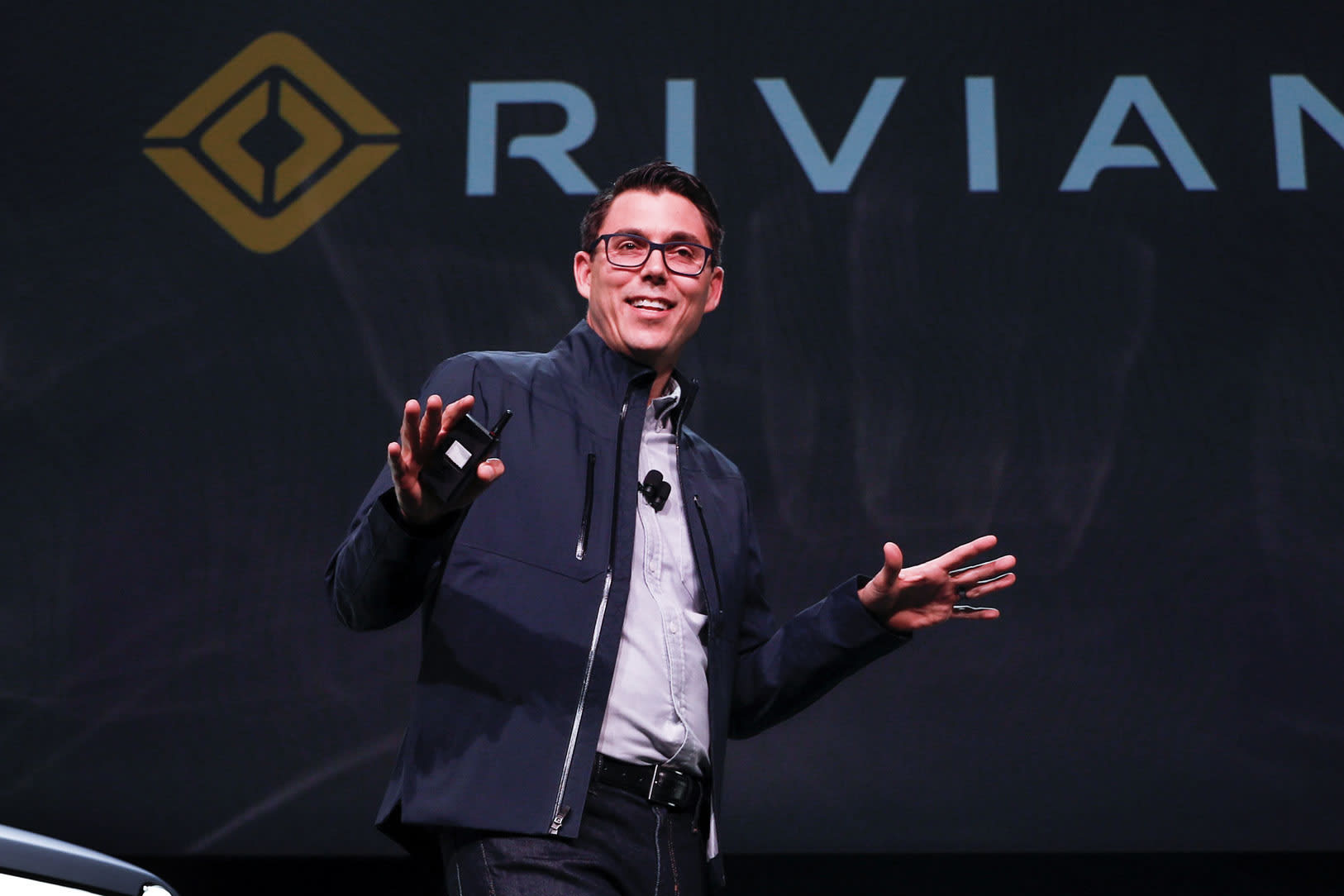Electric vehicle maker Rivian plans to use new types of battery cells in its electric trucks, delivery vans and SUVs the company said Thursday in a 2021 fourth-quarter shareholder letter. These include cells made with lithium iron phosphate (LFP) chemistry for its standard-level vehicles, and high-nickel chemistry for its longer-range vehicles.
LFP battery cells do not require any nickel or cobalt, which can be expensive or hard to obtain. They are also generally considered more stable, but less energy-dense, than nickel cobalt aluminum oxide cells, which had been used by Tesla and other automakers in electric vehicles. While they can be fully discharged and charged without as much damage to the cell over time, LFP batteries do not generally deliver the same range as NCA and other types.
High-nickel chemistry batteries, meanwhile, are more energy dense, can be charged more quickly and deliver more miles per charge for a pack of the same or less weight made with these cells.
Rivian founder and CEO RJ Scaringe explained on an earnings call after hours on Thursday that the company and its suppliers are facing a variety of constraints due to the Covid pandemic, Russia’s invasion of Ukraine and their impacts on global supply chains. He said Rivian was “looking at one of the most challenging supply chain environments the automotive industry had ever seen.”
Scaringe said that the first LFP cell is being sourced through a partner, which he did not name, but said that the company is “also developing in-house battery chemistries and battery production capabilities.”
Rivian Commercial Vehicles, such as the EDV-700 it developed for Amazon, should have “similar daily range capabilities with LFP chemistry, and this chemistry provides meaningful cost savings for us,” Rivian wrote in its shareholder letter.
In its consumer electric vehicles, including the R1T pickup and R1S SUV, Rivian expects an estimated range of over 260 miles with the LFP-based standard battery pack.
Tesla announced plans to switch to LFP battery cells for its standard battery packs in October 2021, and both companies are following in the footsteps of Chinese electric vehicle and battery manufacturers. The technology has been generally promoted in China, and as battery researchers Roskill have noted, around 95% of LFP cathode manufacturing is based in China. Eliminating cobalt means reducing reliance on suppliers where forced labor is still a concern. Cobalt extraction is still largely concentrated in the Democratic Republic of Congo, where it is linked to human rights abuses and child labor.
Rivian is aiming to produce 25,000 battery electric vehicles in 2022 and aims to deliver its 55,000th vehicle within 2023.
The company’s shares dropped more than 12% after hours on Thursday after the company missed Wall Street’s fourth-quarter earnings expectations and forecast a modest increase in vehicle production for 2022.

buy ivermectin stromectol – buy carbamazepine 400mg for sale tegretol 400mg generic
buy accutane 10mg pills – buy generic dexamethasone zyvox 600mg price
amoxil online – order valsartan online cheap combivent sale
azithromycin 500mg brand – buy tindamax 300mg bystolic cheap
order omnacortil 10mg pill – progesterone 200mg price buy cheap prometrium
order gabapentin 800mg sale – purchase sporanox without prescription buy generic itraconazole over the counter
amoxiclav drug – augmentin 375mg drug buy duloxetine 20mg generic
purchase vibra-tabs – buy ventolin 4mg glipizide ca
augmentin 375mg tablet – generic nizoral 200mg cymbalta oral
buy generic rybelsus over the counter – buy cyproheptadine 4 mg buy cyproheptadine online
tadalafil generic name – order generic tadalafil 10mg buy sildenafil 50mg sale
order atorvastatin 20mg online cheap – order lisinopril 2.5mg for sale order prinivil
order cenforce for sale – order cenforce sale glucophage 500mg pills
atorvastatin 80mg sale – order norvasc 10mg generic lisinopril 5mg cheap
treat indigestion – buy lopressor 100mg without prescription tenormin 50mg without prescription
methylprednisolone medicine – purchase depo-medrol without prescription triamcinolone 4mg cheap
buy cytotec 200mcg pills – cytotec order online buy diltiazem sale
buy acyclovir sale – zovirax price crestor online buy
buy domperidone generic – tetracycline 250mg pill cyclobenzaprine ca
domperidone ca – buy domperidone 10mg online flexeril order
buy generic inderal online – inderal uk methotrexate 5mg over the counter
warfarin 5mg generic – buy maxolon generic buy cheap generic cozaar
levofloxacin ca – buy avodart online cheap buy generic ranitidine
buy esomeprazole – order nexium 40mg capsules purchase sumatriptan online
buy mobic 15mg generic – buy celebrex 200mg pills buy flomax 0.4mg generic
order ondansetron 8mg generic – order zofran for sale order simvastatin 10mg generic
valacyclovir 1000mg cost – proscar usa buy forcan medication
buy generic modafinil buy provigil 200mg online buy generic modafinil 100mg purchase modafinil without prescription provigil cheap modafinil 200mg over the counter buy provigil cheap